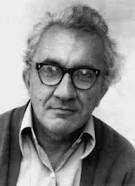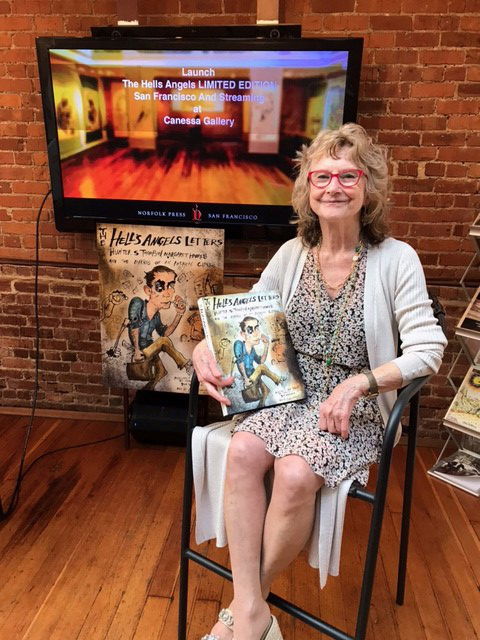Mircea Ivanescu has just risen up to the heavens, or wherever he is. I say it that way because he was so unpredictable, so unique, never able to be “one of the gang,” a joiner. He lived in Romania. Once about to come to the US – I believe he was invited to be the chancellor of a university – he went to get a visa and was interviewed about his English. Now, Mr. Ivanescu had translated a slew of English texts, including Joyce’s Ulysses, and practically all of Kafka from the German. He was a shy man, who never pushed himself forward. Rather, he was reclusive and hard to find.
At the interview, instead of admiting that he was fluent, he somehow let the interviewer wonder if it spoke English well enough for a visa. The interviewer hadn’t a clue about his identity. As it turned out, Mr. Ivanescu didn’t go to the U.S. What would have happened if this brilliant, shy, postmodernist poet had arrived on our shores, I don’t know, except something illuminating for us. And him. Instead, he stayed in his country, continued translating practically the whole library of famous English-language books, got the Gold Medal for his life work in poetry and translating. And eventually, when his wife died, retired behind his garden gates, never to emerge. I learned a few moments ago that he just flew away into the heavens yesterday.
Ivanescu is in Keep This Quiet! IV.
The links to his obituary are no longer live, but here you can read about a book of his, in English, on Amazon. Here are some samples of his “confessional poetry” he translated himself and gave to me freely to publish or not:
Some Fragments
only, there, where it seemed so simple to think
myself into some other one—a bearded young man
seated at a table, and nursing between his hands—why were his hands so cold?—a glass where a white, limpid, blind
eye was fixing him—there where once i used to say
to myself that “where once the waters of your eyes
spun to my screws . . .” and so on, that glassy time is frozen stiff, and the room all around has cast its image in a pool
of ice—a map image, rounded and deep,
and inside this cylinder of ice there is only the feeling
that the land i once was living in,
had been forgotten. I knew, once i could have moved my words into little pawns on that chequeur board—and tell myself
i was getting close to changing them finally
into a living queen—and now to see how
they stood there, inert, cast in ice—
and it is not true. for, see, as i sat there, telling myself i hear
“a kind of cry from a very arctic winter” and that
“there are glimpses of shadows who seem
to signal something inaudible and important,” there come her words, saying she thinks those pawns
could rise out of the stone—
like in a piano piece when the player’s fingers
hold still for a moment—and in that split second,
before she resumes her playing, the world is still whole, only so, cast in ice, stopped in stone—and the words
to tell it to resume breathing cannot break
out of this stony charm—
7.
and she wonders aloud how it comes that every day
we are offering her texts, where without telling her so, explicitly, we are making assay to engage her limed soul into such bounds that will stick her forever
in remembrances she was once so heedless as to stick in amid their wicked syllables. that is, we daily write her words of such lying craft she would come to believe
1.
in their insidious music—(for she herself does think
there is some truth in the music of such words)
so, we are giving her such texts as have the subtlety
and hissing of serpents—and, by taking out of contexts one or any other one of such words and by stroking it
she would find out electricity itself—
(and electrical fire is the spiritual substance
which God sends to sustain both man and beast,
in their physical bodies) and make them tread to all
the measures upon the music—and music is surely in all words, and is the food of love, of thoughts—and thought
teaches us (we’d rather try to teach her so)
to try and enjoy that feeling of irresponsibility toward the sense, which is true wisdom—and our daily words
have but the effect like to that of a rune or charm,
and we rest content that our tongue in uttering them
has that in purity what it wants in music.
Notes:
“o limed soul, that struggling to be free, art more engaged; help, angels! Make assays . . .” 3, 3, 68-70
note: o limed soul . . .” Bond (i, 173) quotes Eupheus, “like the bird in the limebush which the more she striveth to get out, yet faster she sticketh in.”
(cambridge ed. dover wilson) “for he has the subtlety and hissing of a serpent, which in goodness he suppresses.”
“for by stroking of him i have found out electricity . . . for the electrical fire is the spiritual substance, which God sends from heaven to sustain the bodies both of man and beast.”
“if music be the food of love—play on”
christopher smart—jubilate agno my cat jeoffrey
twelfth night
“i would remind you, first, that the music of poetry is not something which exists apart from the meaning. otherwise, we could have poetry of great musical beauty which made no sense, and i have never come across such poetry . . . we enjoy the music, which is of a high order, and we enjoy the feeling of irresponsibility towards the sense . . . effect somewhat like that of a rune or charm, but runes and charms are very practical formulae designed to produce definite results, such as getting a cow out of a bog”
t. s. eliot—the music of poetry “for his tongue is exceedingly pure so that it has in purity what it wants in music”
9.
how many worlds we have? so that, by going now
away, in a short while, she’ll already have forgotten
how once we tried, with ox-cart and post-chaise,
to push with our leaden words towards her, to let them down there, before her—she will no more
know that we have tried with clear outlined contours and sterner lines to draw images of her—
crescent new images of her—and she will confuse this our phantastikon—so that the whole
visible world be but a symbol made visible only
in order that we may apprehend ourselves and not be any more blown hither and thither, like a flame in the night,
and she going away, we are left with only the hand
that tried to paint the soul—and for her forgotten
all those obscene reveries of the inward gaze—
and serves us right, for “to use
a symbol with an ascribed or intended meaning is,
usually, to produce very bad art”—
but will she, just a second, tell herself that we by such tricks tried to color,
that is the words, take on “forms interpretive of the divine order”? “to lead on to an exteriorization of the sensibility
and interpretation of the cosmos by feeling”?
and that we so tried to conceive,
instead of merely reflecting and observing?
Notes:
“how many worlds we have?”
“poetry had been merely the vehicle . . . the ox-cart and post-chaise for transmitting thoughts”
pound—prolegomeny
“the whole visible world itself, we are told, is but a symbol made visible in order that we may apprehend ourselves, and not be blown hither and thither like a fame in the night”
symons—london nights preface to 2 nd ed.
“the hand painted the soul,” the kind of achievement which pound sees to be the peculiar virtue of medieval art . . . (about “hand and soul,” by d. g. rossetti)
“to use a symbol with an ascribed or intended meaning is, usually, to produce very bad art”
christopher smart
canto i (1917 version)
pound—vorticism
“did that ‘color’ take on forms interpretive of the divine order” / did it lead to an ‘exteriorization of the sensibility”? and interpretation of the cosmos by feeling?”
pound—spirit of romance “you may think of him . . . as conceiving, instead of merely reflecting and observing”
contrarywises
1.
would it be right for us to try (we ask ourselves,
and we don’t think we’d find the answer), would it be the right thing to now come back
to that once, long ago true thought of her,
when we didn’t even know she did exist?—
would it be right to start from there?—say,
we once, reading this or that book, we were
dimly thinking of a young girl squatting on the floor, and she not daring to look up from there,
where she was following with slow fingers
the map in that carpet, not wanting to look out
the window upon the grass in the dead yard outside, and years later, in some other country, she herself didn’t know it existed somewhere on the map
we did lift her slender hand,
with fingers so cold, like in a dream,
and she was tracing with them on air
slow hieroglyphs explaining how she was afraid, then, on that evening when she still believed
she’d find some sense in some books of quaint
and, perhaps, in truth, not forgotten, lore.
Notes:
“contrariwise, continued tweedledee, if it was so, it might be; and if it were so, it would be; but as it isn’t, it ain’t. that’s logic”
8.
and so, like man’s inner selves standing before the great one’s intellect, we are now standing with all our little shades of passions spent (only, we are to shun adjectives) before
pound—vorticism
lewis carroll
her eyes—and would that mean we have lost
that bon del intelleto, which is the good
of understanding—and, freed at last of the sense of truth, that is, not being any more bound to be continuous
to ourselves, we stay there for a while,
and look at her,
and reach her with words, books, lies that is,
and gazing on her, such we become within, as was
that one, tasting the grass that made him
sea-fellow to the other gods,
and being the informing virtue in these stars
which sweep around her.
Notes:
“vigor and wit”—”between his vigor and his suavity, his wit and his tenderness, the intoxication grows . . .”
pound—spirit of romance
“write without adjectives”—”the true pot is most easily distinguished from the false, when he trusts himself to the simplest expression, and when he writes without adjectives”
pound—ditto
“i think his thoughts outran even his pen’s celerity, so that often he writes only their beginnings.”
pound—ditto
“and like the sun . . .”—”la gloria di colui che tutto move / per l’universo penetra e risplende / in una parte piu, e meno altrove” (the glory of him who moveth all—penetrates and is resplendent through the all—in one part more and in another less)
paradiso, i—tr, ezra pound
“it is not easy to keep our eyes open to receive the look that is seeking us. doubtless not only for criticism but for all intellectual investigations, one must say: “look, in order that you may be seen” (“il n’est pas facile de garder les yeux ouverts pour acueillir le regard qui nous cherche. sans doute, n’est-ce pas seulement pour la critique, mais pour toute entreprise de connaissance qu’il faut affirmer: “regarde, afin que tu sois regarde” )
jean staxobinki, l’oeuil vivant
“men’s inner selves . . .”—”that is to say, men’s inner selves stand visibly before the eyes of dante’s intellect, which is guided by a personification of classic learning, mystic theology, and the beneficent powers”
“continuous . . .”—”j’appelle verite ce qui continue”
pound—the spirit of romance
camus—noces, tipassa “gazing on her . . .”—gazing on her such i became within, as was glaucous, tasting of the
grass that made him the sea-fellow of the other gods” “informing virtue in these stars which sweep around . . .”
“created was the matter which they hold, created was the informing virtue in these stars which sweep around them. the life of every brute and of the plants is drawn from compounds having potency, by ray and movement of the sacred lights. but your life . . .” (“creata fu la materia ch’egli hanno—creata fu la virtu informante—in questa stella che intorno a lor vanno”)
9.
now let us seek not for things that could happen
each time we meet, for she could, for instance, turn her eyes toward us, and even see us in truth, or she may
some other time feel fed up with our constant being late each time we are to meet her—(and she has already
put on her coat, preparing to go away and forget
she lost some time waiting for us)—but let us try
to find that which gives sense to such moments
that might have been our meetings. fact is
that, even not seeing her, we did in truth
meet, as agreed, and her waiting for us might have had
a sense, a true significance—and all base,
real happenings of day-to-day life scorning,
at least some one of us two has dreamed of such a meeting in that more real realm of words—
and words make up dreams, and dreams alone
can truly be—and what if in such a dream
we were to come to her—and look her in the face?
the risk is that she could take all these lines as simple, or contorted, madrigals,
only, beware she may, for leaving the clear shelter
of those “leaves and shadows” that “concealed her completely” she’ll go away—not knowing that, like in spanish portraits,
she goes demurely followed by strange apes,
which are our thoughts, gamboling round about
her cool indifference.
Notes:
“their way of seeing in the artistic and cultural phenomenon a certain meaning. i always believed that we do not live among things happening, but among things that have meaning, among those meanings. the real world, as well as the world of books, makes up a system— the condition of the intellectual is exactly this: to think about this system, to catch those
(paradiso, vii—tr.e.p.)
subtle links which give coherence, which make cohere our universe, to guess which is the necessary hidden under the appearance of the accidental. the intellectual has a special art of chiromancy, he reads in those lines—similar and unique—of the world, this world’s fundamental and secret destiny . . . his books all have a common goal: to reveal the ideological coherence in the incoherence of facts, to find the sense in that which seems to have no sense, the unity in diversity. the intellectual’s activity has this significance—to find, surprisingly, the significance of culture, if by this concept of culture we mean all that in the universe of our day-to-day life can be found to have a meaning. the rest is nothingness.”
nicolae manolescu—meeting of a second-degree
“love thou thy dream / all base love scorning. / love thou the wind / and here take warning / that dreams alone can truly be. / for ’tis in dream i come to thee”
“clear is my love but shadowed / by the spun gold above her, / ah, what a petal those bent sheaths discover! / / the olive wood hath hidden her completely, / she was gowned discreetly / the leaves and shadows concealed her completely. // fair is my love but followed / in all her goings surely / by gracious thoughts, she goeth demurely”
ezra pound—madrigal
Author: Mircea Ivanescu



